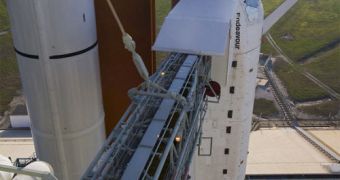Flight controllers at NASA have decided to postpone the launch of space shuttle Endeavor by at least 10 days. The decision was not taken on account of any glitch or malfunction, but because officials wanted to avoided a situation that would have created a traffic jam in space.
Later this month, around the same time Endeavor was originally supposed to launch, an unmanned resupply capsule, built and delivered by Russia, will make its way to the orbital facility.
Experts with the space agency say that the Russian-built Progress capsule will launch on April 27, and that it will therefore arrive at the International Space Station (ISS) on April 29.
As such, Endeavor's STS-134 flight is now scheduled to launch no earlier than Friday, April 29, at 3:47 om EDT (1947 GMT). This will give the resupply ship ample time to dock and get out of the way.
“Looking at the International Space Station, it was the best thing to do to have Endeavor stand down for a week and a half, and launch once the Progress is already docked to the space station,” Allard Beutel, a NASA spokesman, said for Space.
Talks between officials at NASA and international partners have revealed the impracticality of all other options of resolving the situation. Experts say that delaying Endeavor's launch is the option that made most sense under the circumstances.
“Apparently there is a biological experiment onboard the Progress that has a very short shelf life onboard that spacecraft. We even looked at the possibility of putting that experiment on Endeavor, but logistically that didn't work out as well,” Beutel added.
The 6 space agencies working on the construction of the ISS cannot afford not to make the best of the two remaining shuttle flights. Unlike space capsules, the orbiters can carry massive amounts of material to low-Earth orbit.
This allows mission controllers to carry spare parts that they couldn't otherwise deliver. The main idea behind the STS-134 and STS-135 missions is to endow the orbital outpost with the capability of repairing itself in case of an emergency.
During its last flight, Endeavor will deliver a $2 billion particle physics experiment called the Alpha Magnetic Spectrometer (AMS), whose goal is to clear up some of the biggest mysteries in the Universe.
It will analyze cosmic rays and other radiation in search for tell-tale signs of the composition of dark matter and the existence of dark energy. The AMS is the most complex experiment to make its way into space.
Endeavor's flight will last for about 14 days, and 4 spacewalks will be conducted during this time.

 14 DAY TRIAL //
14 DAY TRIAL //